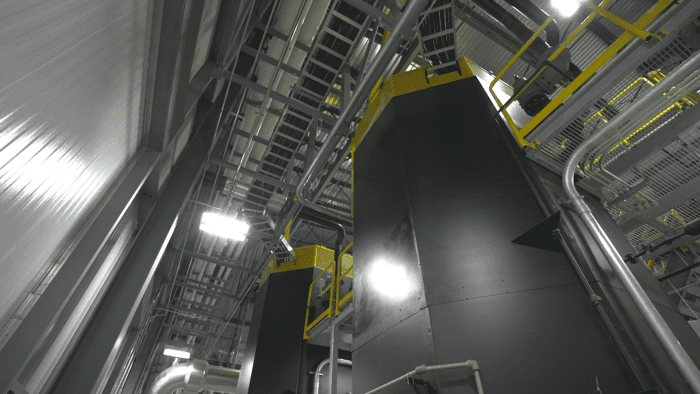Global spirits giant Diageo PLC, which owns the brands Guinness, Tanqueray and more, has opened its first carbon-neutral distillery in North America.
The 72,000-square-foot, Lebanon, Ky., facility will be used for a portion of its Bulleit bourbon operations. The facility has the capacity to produce up to 10 million “proof” gallons per year using electrode boilers that are powered by 100% renewable electricity. Renewables will be used throughout the cooking, distillation and dry house processes.
Diageo DEO, -0.56% DGE, +0.77% will use a mix of wind and solar energy to power the electrode boilers, on-site electric vehicles, internal and external lighting and equipment, making the facility one of the largest of its kind in North America.
These technologies, along with advanced metering, will allow the Diageo Lebanon Distillery to avoid roughly 117,000 metric tons of carbon emissions annually, it says. That’s the equivalent of taking more than 25,000 cars off the road for a year.

Renewable-energy powered boilers at Diageo’s new Bulleit facility.
The new plant supplements existing production at Bulleit Distilling Co. in Shelbyville, Ky. Bulleit also makes rye.
Read: Guinness to open brewery in Chicago’s Fulton Market: report
The company has already halved the carbon emissions associated with its operations since 2008 and is now working to reach net-zero carbon across its direct operations by 2030, via 100% renewable energy.
According to Beverage Industry Environmental Roundtable research on the carbon footprint of spirits, actual distillation accounts for between 36% and 40% of overall emissions, while a spirit’s glass bottle contributes between 19% and 20%. The remainder is accounted for by warehousing, base materials, transport and more.
“We believe now more than ever that businesses have a responsibility to our environment, our communities and our planet,” said Sophie Kelly, senior vice president of whiskies, Diageo NA.

Diageo’s on-site electric vehicles at its Lebanon, Ky., facility.
The carbon neutrality of the Lebanon distillery covers Scope 1, or direct emissions from the production site, and Scope 2, the indirect emissions a business is linked to, for instance from electricity generation. The site will require residual amounts of carbon offsets to be purchased, in part because Diageo will be purchasing emergency backup power.
The pledge does not extend to Scope 3 emissions. That category applies to the emissions from non-owned portions of a supply pipeline, such the retailer that sells the bottle of spirits.
Diageo has said it hopes to achieve net-zero carbon across the entire supply chain by 2050 or sooner, with an interim milestone to achieve a 50% reduction by 2030.
Diageo took over Bulleit, then a niche Kentucky bourbon, as part of its 2001 purchase of the Seagram Co. portfolio. The U.S.-traded ADRs of the London-based company are up over 20% in 2021 and more than 40% over the past year.
Read:The tipping point for a low-carbon energy future is right around the corner: S&P Global Platts
Packaging waste is among the major areas of concern for the spirits industry. English producer Silent Pool Distillers created earlier this year what it claimed was the “world’s first” spirit in a recycled paperboard bottle. Green Man Woodland Gin uses 77% less plastic than other plastic bottles and has a carbon footprint six times lower than glass or PET plastic bottles.
Some makers are using new innovation to achieve greener goals. A startup called Bespoken Spirits has had its eye on sustainable distilling since its launch three years ago. The Bespoken technique bypasses the typical lengthy barrel aging of its rye, bourbon and other offerings by creating sped-up aging in a controlled environment with wood staves. The flavoring develops much quicker and so overall, energy use is reduced.
Similar climate considerations face Scotland’s hallmark whisky industry. Whisky is the U.K.’s most valuable net export, worth nearly £5 billion in 2019, but its largest distilleries have depended for years on burning gas, as well as fuel oil for remoter areas.
Whisky producers are aware that the droughts and seasonal variations of climate change will hit Scottish barley harvests and the water supplies essential to whisky production, while flooding could impact both distilling and transportation, Morag Garden, the Scotch Whisky Association’s head of sustainability told the Guardian.
The industry has set a net zero target date of 2040, 10 years earlier than the U.K. government’s current goal and five years quicker than Scotland’s, according to the SWA.
Corporations, including the spirits industry, increasingly believe that carbon-cutting efforts are part of the cost of doing business. For instance, about 105 signatories that together generate over $ 1.4 trillion in global annual revenues and have more than 5 million employees across 25 industries in 16 countries, joined Amazon AMZN, -2.50% in its Climate Pledge earlier this year.
Many have tried to respond to pro-climate stances of their consumers and get ahead of increased regulations; some face pushback charging that they rely too much on carbon offsets (promoting tree planting programs, for instance) instead of aiming to reduce fossil-fuel use.
